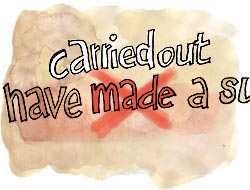TIP:
Writing summarising sentences in note form, based on the information you are given, can help you to select and organise the information to include when you are writing a conclusion.
1. Collocation casino.

Play the casino game. Decide if the collocations in each sentence are correct or incorrect.
For example:
I would like to do the following recommendations.
= Incorrect
I would like to make the following
recommendations.
= Correct
How many points can you win?
See a table of some common collocations found in written reports.
| verbs | + nouns |
| carry out, do | research, an inspection, an investigation, a survey |
| come up with | a plan, a solution, a recommendation |
| compile | a list |
| draw, come to, arrive at | a conclusion |
| establish | criteria |
| evaluate, assess | options |
| meet, fulfil, satisfy | requirements |
| gather, collect, request, collate | information |
| give, list | solutions |
| identify, select | key information |
| make | a recommendation, a suggestion, a decision, a point, a comparison |
| reach | a decision, a conclusion |
| take | factors into account |
2. Drawing conclusions.

As a result of the findings in Section 4 the Nova and Toshdo tablets were shortlisted for recommendation. Look at the table of information again and answer the questions below.
Writing summarising sentences in note form, based on the information you are given, can help you to select and organise the information to include when you are writing a conclusion.
| Specification | Nova | Toshdo | Kimov |
| Operating system | Robot 5.1 | Robot 5.0 | Lexical 7 |
| Processor | 2 X 1GHz dual-core | Monkey 7 dual-core | 1GHz dual-core |
| Display size | 10.1" | 10.1" | 7" |
| Resolution | 1280 x 800 XGA | 1280 x 800 WXGA | 1024 x 600 |
| RAM | 1GB | 1.5GB | 512MB |
| Memory | 16GB or 32GB | 16GB or 32GB | 8GB |
| Battery life (max.) | 14 hours | 10 hours | 8 hours |
| Weight | 589 g | 725 g | 362 g |
| WiFi reception | strong | strong | moderate |
| Support and service | Yes | Yes | No |
| Price | $472 | $380 | $160 |
3. Two samples.
Comparing samples of different reports can highlight useful language and text features that you can incorporate into your own reports.
Read two different samples of the Conclusions and Recommendations section of a written report. Which sample is more appropriate?
Sample A
Conclusions
After looking at the three shortlisted models I found that the
best ones for classroom use, for teachers and students, are
probably the Nova and the Toshdo.
It is quite important to consider the long-term benefits to students and teachers when choosing the best tablet for classroom use. Apart from the initial cost, warranty, speed, size and battery life are the important things to consider. Both the Nova and the Toshdo are good in these areas, with very similar performance, but the Nova is just a little bit lighter and faster.
Recommendations
Based on all of this, I'd like to make these recommendations:
After checking out both of the tablets, I think the Nova is the
best, because it's a bit smaller, sturdier and works better, which
means it's worth the extra cost. So, I would recommend the Nova
tablet to use in our classrooms.
Sample B
Conclusions
After investigating the three shortlisted models it was found that
two of these are suitable for classroom use and would meet teacher
and student requirements of performance and specifications: the
Nova and the Toshdo.
It is important to consider the long-term benefits to students and teachers when choosing the best tablet for classroom use. Apart from the initial expense of purchase, warranty, speed, size and battery life are the key factors which have been taken into account. Both the Nova and the Toshdo score highly in these areas, with comparable performance, and the Nova being marginally lighter and faster, but also more expensive.
Recommendations
These conclusions lead to the following recommendations. After
taking both tablets into consideration, it can be said that the
Nova is the most suitable due to its size, durability and
performance, which could be seen as justifying its greater
expense. Therefore, I would recommend the Nova tablet for use in
our classrooms.
4. Text completion.

Use the phrases to complete Sample B from the previous exercise. This exercise is in two parts. Scroll down to see Part 2.
Part 1
Part 2
5. A more formal style.
Match the words and phrases on the left to their more formal equivalents. (Match all the items to check your answers. You can only start again when all the matches are correct.)
6. Achieving a formal style.
Read the first sentence, and then type in the missing words to complete the second sentence, written in a more formal style. You can double-click or tap on each space to see the first letter of the missing word.
8. Cause and effect.
Using a variety of language and avoiding repetition can leave the reader with a more positive impression. What's more, being able to say the same thing in different ways gives you more scope when highlighting key information and linking ideas in each section of a report. In the following exercises you will practise different ways of describing cause and effect.
Look at the example sentences describing cause and effect.
These conclusions lead to the following
recommendations.
The Nova is the most suitable due to its size.
Now match the two parts to complete more "cause and effect" sentences. (Match all the items to check your answers. You can only start again when all the matches are correct.)
10. Cause and effect.
Can you remember? Type in the missing words to complete the sentences. (Tip: Double-tap/click the answer space to see the first letter of each missing word.)